
3 Feet High and Rising is the debut studio album by the American hip hop group De La Soul, released on February 6, 1989, by Tommy Boy Records. It was the first of three collaborations with the producer Prince Paul, and was the critical and commercial peak of both parties. The album title comes from the Johnny Cash song "Five Feet High and Rising". The album contains the singles "Me Myself and I", "The Magic Number", "Buddy", and "Eye Know".
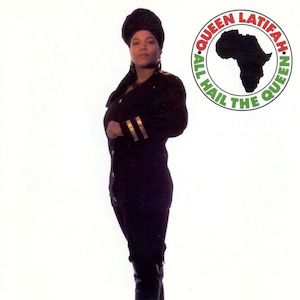
All Hail the Queen is the debut studio album by American rapper Queen Latifah. The album was released on November 7, 1989, through Tommy Boy Records. The feminist anthem "Ladies First", featuring Monie Love, remains one of Latifah's signature songs.
The Native Tongues was a collective of late 1980s and early 1990s hip-hop artists known for their positive-minded, good-natured Afrocentric lyrics, and for pioneering the use of eclectic sampling and jazz-influenced beats. Its principal members were the Jungle Brothers, De La Soul, A Tribe Called Quest, Monie Love, and Queen Latifah. The collective was also closely tied to the Universal Zulu Nation. Rolling Stone cites the track "Doin' Our Own Dang" as "the definitive Native Tongues posse cut".
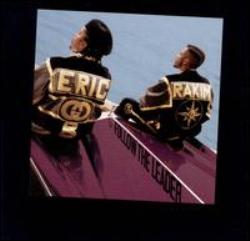
Follow the Leader is the second studio album by American hip hop duo Eric B. & Rakim, released on July 26, 1988. Following their debut album, Paid in Full (1987), Eric B. & Rakim left 4th & B'way Records and signed with Uni Records, a subsidiary label of major label MCA Records. They recorded Follow the Leader at Power Play Studios in Long Island City in Queens, New York. The duo produced, composed, and arranged the album with additional contributions from Rakim's brother Stevie Blass Griffin, who contributed with various instruments. Eric B. & Rakim worked with audio engineers Carlton Batts and Patrick Adams on the album. In a similar manner to their first album, a "ghost producer" was brought in for two songs. In a 2007 interview with Unkut.com, The 45 King said he produced both "Microphone Fiend" and "The R". "Microphone Fiend" was originally made for Fab 5 Freddy, until 45 King gave it over to Eric B., the group's "DJ".

The Beatnuts is an American hip hop group and production duo from New York City. Its current members are JuJu and Psycho Les. JuJu is a Dominican American from Corona and Psycho Les is a Colombian American from Jackson Heights, Queens. Although only peripheral members, they are routinely acknowledged by Q-Tip as being members of Native Tongues. The Beatnuts were originally a trio before Fashion, now known as Al' Tariq, left the group to start a solo career. V.I.C. was also a member of The Beatnuts' production team for a while.
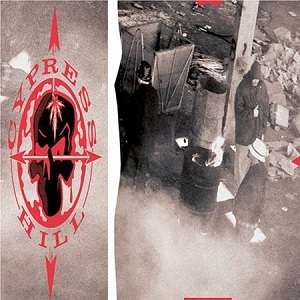
Cypress Hill is the debut studio album by the American hip hop group Cypress Hill. It was released on August 13, 1991, by Ruffhouse Records and Columbia Records. The recording sessions were held at Image Recording Studios in Los Angeles from August 1990 to May 1991. The album was produced by DJ Muggs. The album was critically and commercially successful and received major airplay on urban and college radio. The album went double platinum in the U.S. with over 2 million units sold. The album is broken down track-by-track by Cypress Hill in Brian Coleman's book Check the Technique, published in 2007.
A posse cut is a popular form of song in hip hop music that involves successive verses by four or more rappers.

Run-D.M.C. is the debut studio album by American hip hop group Run-D.M.C., released on March 27, 1984, by Profile Records, and re-issued by Arista Records. The album was primarily produced by Russell Simmons and Larry Smith.

Golden age hip hop refers to hip hop music created from the mid or mid-late 1980s to the early or early-mid 1990s, particularly by artists and musicians originating from the New York metropolitan area. A precursor to the new-school hip hop movement, it is characterized by its diversity, quality, innovation and influence on overall hip hop after the genre's emergence and establishment in the old-school era, and is associated with the development and eventual mainstream success of hip hop. There were various types of subject matter, while the music was experimental and the sampling from old records was eclectic.

Mecca and the Soul Brother is the 1992 debut album from hip-hop duo Pete Rock & CL Smooth. The album contains their best known song, "They Reminisce Over You (T.R.O.Y.)". Mecca and the Soul Brother has been widely acclaimed as one of the greatest hip hop albums of all time. The album was mostly produced by Pete Rock and executive produced by DJ Eddie F of Heavy D & the Boyz.

By All Means Necessary is the second album from American hip hop group Boogie Down Productions, released in April 12, 1988 on Jive Records. After the 1987 murder of DJ-producer Scott La Rock, MC KRS-One moved away from the violent themes that dominated Boogie Down Productions' debut, Criminal Minded, and began writing socially conscious songs using the moniker the Teacher.

Straight out the Jungle is the debut album by the American hip hop group Jungle Brothers. The album marked the beginning of the Native Tongues collective, which later featured popular artists such as De La Soul, A Tribe Called Quest and Black Sheep. The album's masters have a lower quality to other hip-hop albums of its kind, compared to the singles.
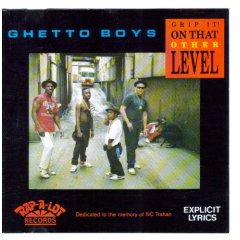
Grip It! On That Other Level is the second studio album by the Houston, Texas based hip-hop group, the Ghetto Boys, released on March 12, 1989, on Rap-A-Lot Records. Following the disappointing results of the group's first album, Rap-A-Lot CEO James Prince replaced two of the group members with Scarface and Willie D, who joined original members Bushwick Bill and DJ Ready Red. Recording for the album began in 1988, and finished in early 1989. The majority of the album's tracks were produced by DJ Ready Red, and much of the album's lyrical content deals with violent and misogynistic topics, which would later be credited for pioneering the horrorcore hip hop subgenre.

Power is the second studio album by American rapper Ice-T, released on September 13, 1988, by Sire Records. Recorded at Syndicate Studios West in Los Angeles, the home studio of DJ Evil E, it was produced by Ice-T and Afrika Islam. The Los Angeles Daily News noted that its lyrical themes ranged from sex to gun violence, and that Ice-T "implicates everyone from radio programmers to the police as accomplices in the decline of western civilisation." The album contains lyrics that began a feud between Ice-T and rapper LL Cool J. The album cover, which features Ice-T's then-girlfriend Darlene Ortiz, Ice-T, and DJ Evil E, was described as "perpetuating stereotypes" by the Chicago Tribune and "violence-glorifying" by both the Chicago Sun-Times and The Sydney Morning Herald.

Frederick Crute, known professionally as Kool DJ Red Alert, is an Antiguan-American disc jockey who rose to fame on WRKS 98.7 Kiss FM in New York City and is recognized as one of the founding fathers of hip hop music and culture. His weekly radio show airs on WBLS 107.5 FM from Monday to Saturday at 6pm EST.

AmeriKKKa's Most Wanted is the debut studio album by American rapper Ice Cube, released on May 18, 1990, by Priority Records. It was his first solo album, after an acrimonious split from his former group N.W.A. Primarily produced by Public Enemy's production team the Bomb Squad, the album was a critical and commercial success, and was certified platinum in the United States on June 23, 1990.

Lyte as a Rock is the debut studio album by American hip hop recording artist MC Lyte. It was released on April 19, 1988, via First Priority and Atlantic Records, and was produced by Audio Two, Prince Paul, and King of Chill and his group, Alliance.

Strictly Business is the debut album by hip-hop duo EPMD. It was released on June 7, 1988, by Fresh/Sleeping Bag Records around the world and BCM Records in Germany. It peaked at No. 80 on the Billboard 200 soon after release, yet it earned an RIAA gold album certification within four months of its release. In addition, it has received much positive critical attention since its release. In 2012, the album was ranked number 453 on Rolling Stone magazine's list of the 500 greatest albums of all time.
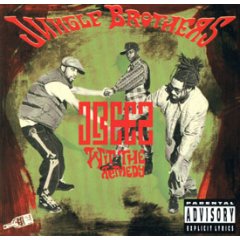
J. Beez Wit the Remedy is the third album by the Jungle Brothers, released in 1993 on Warner Bros. Records.

Jungle Brothers are an American hip hop duo composed of Michael Small, & Nathaniel Hall. Hailed as pioneers of the fusion of jazz, hip-hop, and house music, they were the first hip-hop group to collaborate with a house-music producer. The trio released their debut album, Straight out the Jungle in July 1988. Their hip-house club hit single, "I'll House You" was added to the album in late-1988 reissues. Fostered by Kool DJ Red Alert, the Jungle Brothers' success paved the way for De La Soul, A Tribe Called Quest, and eventually the Native Tongues collective that they founded.


















